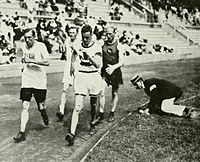Contents
| Men's 10 kilometres walk at the Games of the V Olympiad | |||||||||||||
|---|---|---|---|---|---|---|---|---|---|---|---|---|---|
 The final with George Goulding in the middle. | |||||||||||||
| Venue | Stockholm Olympic Stadium | ||||||||||||
| Dates | July 8, 1912 (semifinals) July 11, 1912 (final) | ||||||||||||
| Competitors | 23 from 12 nations | ||||||||||||
| Medalists | |||||||||||||
| |||||||||||||
| Athletics at the 1912 Summer Olympics | |
|---|---|
| | |
| Track events | |
| 100 m | men |
| 200 m | men |
| 400 m | men |
| 800 m | men |
| 1500 m | men |
| 5000 m | men |
| 10,000 m | men |
| 110 m hurdles | men |
| 4 × 100 m relay | men |
| 4 × 400 m relay | men |
| 3000 m team race | men |
| 10 km walk | men |
| Road events | |
| Marathon | men |
| Field events | |
| Long jump | men |
| Triple jump | men |
| High jump | men |
| Pole vault | men |
| Standing long jump | men |
| Standing high jump | men |
| Shot put | men |
| Discus throw | men |
| Hammer throw | men |
| Javelin throw | men |
| 2-hand shot put | men |
| 2-hand discus | men |
| 2-hand javelin | men |
| Combined events | |
| Pentathlon | men |
| Decathlon | men |
| Cross-country events | |
| Individual | men |
| Team | men |

The men's 10 kilometres walk was a track and field athletics event held as part of the Athletics at the 1912 Summer Olympics programme. It was the second appearance of racewalking, which had debuted at the previous games with the 10 mile and 3500 metre walks. The 10 kilometre was the only racewalking event in 1912. The competition was held on Monday, July 8, 1912, and on Thursday, July 11, 1912. Twenty-three racewalkers from twelve nations competed. [1] NOCs could enter up to 12 athletes. [2]